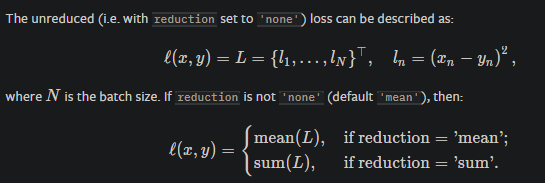Hi All,
I am getting the following issue. I am using nn.MSELoss() to calculate the loss as well as another function 2 calculate the loss. When I just check with one sample, it produces two different results. What could be the problem? (I commented the place where I have issue)
from networks.auto_encoder import AutoEncoder
from layers.encoder import Encoder
from networks.decoder import Decoder
import torch
from dataset.DamadicEvaluatorDataset import DamadicEvaluatorDataset
import torch.nn as nn
from torch.utils.data import DataLoader
from math import sqrt
import matplotlib.pyplot as plt
import torch
from torch.autograd import Variable
def mse_loss(inputs, target):
return torch.sum((inputs - target) ** 2)
def get_loss_list(d_p, e_p):
ae_path = 'models/auto-encoder/auto_encoder_f.h5'
device = torch.device("cuda" if torch.cuda.is_available() else "cpu")
encoder = Encoder()
decoder = Decoder()
model = AutoEncoder(encoder=encoder, decoder=decoder)
model.load_state_dict(torch.load(ae_path, map_location=torch.device('cpu')))
model = model.to(device)
model.eval()
batch_size = 128
ds = DamadicEvaluatorDataset(path_list_scaler=d_p, path_list=e_p)
data_loader = DataLoader(ds, shuffle=True, batch_size=batch_size)
criterion = nn.MSELoss()
loss_t = []
outs = []
for i, data in enumerate(data_loader):
out = model(data.float())
for index in range(out.size(0)):
loss = mse_loss(out[index], data[index].float())
loss_1 = criterion(out[index], data[index].float())
print(loss, loss_1.item()) # these 2 should be same, but I am getting different values
loss_t.append(loss)
outs.append(out[index].squeeze())
return loss_t, outs
Thanks
